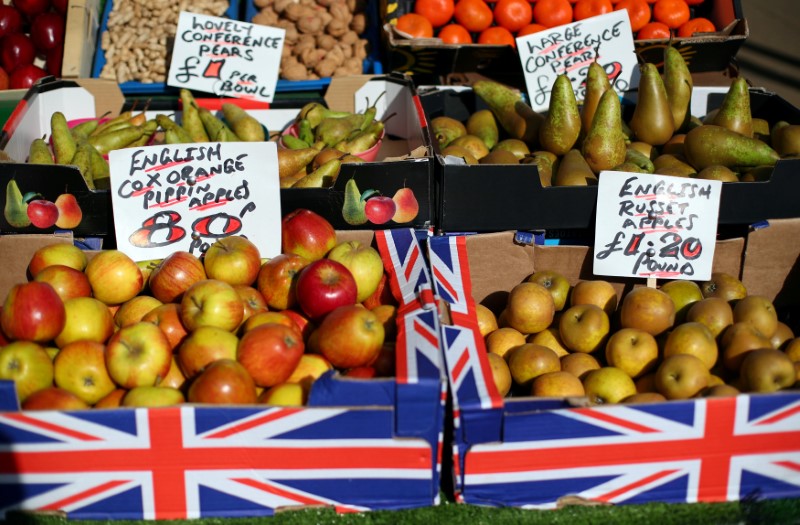
FILE PHOTO – Fruit is displayed for sale at a market stall in Great Yarmouth, Britain, March 21, 2018. REUTERS/Hannah McKay/File Photo
January 16, 2019
LONDON, Jan 16 (Reuters) – – Britain’s inflation rate fell to its lowest in nearly two years in December, pushed down by falling fuel prices and offering some relief to consumers who have reined in their spending ahead of Brexit.
Consumer prices rose at an annual rate of 2.1 percent in December after a 2.3 percent increase in November, the Office for National Statistics said, as a Reuters poll of economists had predicted.
British consumers have been pressured by inflation since the Brexit referendum in June 2016 triggered a slump in sterling of more than 10 percent against the dollar and euro. Inflation peaked at a five-year high of 3.1 percent in November 2017.
But despite the fall in inflation since then, and wages growing at their fastest in a decade, businesses have reported a downturn in consumer spending in recent months, and surveys show households are worried about the outlook for 2019.
On Tuesday lawmakers voted against Prime Minister Theresa May’s Brexit plans by a crushing margin, leaving open the possibility of a potentially damaging no-deal departure from the European Union on March 29.
The ONS said consumer prices over the fourth quarter as a whole stood 2.27 percent higher than a year ago, a smaller rise than the 2.47 percent forecast by the Bank of England in November, based on interest rates staying at 0.75 percent.
The BoE has sketched out a worst-case no-deal Brexit scenario in which sterling would plunge to parity against the U.S. dollar, inflation would exceed 6 percent and the economy contract by 8 percent.
“Inflation eased mainly due to a big fall in petrol, with oil prices tumbling in recent months,” ONS statistician Mike Hardie said.
“Air fares also helped push down the rate, with seasonal prices rising less than they did last year. These were partially offset by small rises in hotel prices and mobile phone charges.”
The ONS figures also suggested less short-term pressure in the pipeline for consumer prices.
Among manufacturers, the cost of raw materials – many of them imported – was 3.7 percent higher than in December 2017, down sharply from annual inflation of 5.3 percent in November and marking the weakest increase since June 2016.
Economists polled by Reuters had expected input prices to rise by 3.5 percent.
Manufacturers increased the prices they charged to customers by 2.5 percent last month compared with 3.0 percent in November, at the bottom end of forecasts that pointed to a reading of 2.9 percent.
The ONS also said house prices in November rose by an annual 2.8 percent across the United Kingdom as a whole compared with 2.7 percent in October.
Prices in London alone fell 0.7 percent, the fifth month of decline — a run last seen during the financial crisis.
(Reporting by Andy Bruce and Jonathan Cable; uk.economics@reuters.com, +44 20 7542 7748)

